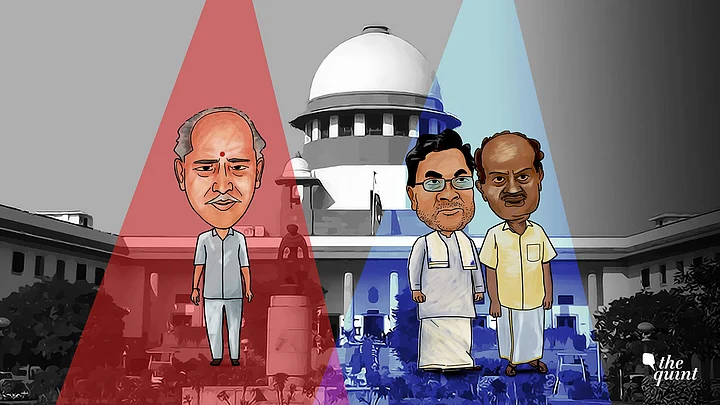The Supreme Court on Friday, 12 July, ordered status quo over the resignation and disqualification of 10 rebel Karnataka MLAs, and said that it will hear matter at length on Tuesday, 16 July.
The apex court noted that there are some important constitutional issues that will need to examined in this case.
The Karnataka political crisis escalated over the last one week as the rebel MLAs and Assembly Speaker KR Ramesh Kumar both approached the Supreme Court with competing claims.
A Supreme Court bench headed by Chief Justice Ranjan Gogoi heard the matters again on 12 July, with the decision of the court set to play a key role in the fate of Chief Minister HD Kumaraswamy’s government.
Several MLAs belonging to the Congress-JD(U) coalition government have attempted to resign over the previous week, prompting the crisis in the state. If the resignations of the rebel MLAs are accepted, the coalition could lose its majority in the Karnataka Legislative Assembly.
The Speaker challenged an initial order passed by the court on the plea of the rebel MLAs, directing him to make a decision about the resignations on Thursday itself, but subsequent comments by him to the press indicate he may still comply with the court’s order – in a qualified way.
Catch all the LIVE updates of the Karnataka political crisis here.
The Petition by the Rebel MLAs
On Wednesday, ten rebel Congress and JD(U) MLAs approached the Supreme Court to challenge the delay by the Speaker in accepting their resignations from the Assembly. CJI Gogoi agreed to grant them an urgent hearing the following day.
When the matter was heard on Thursday morning, senior advocate Mukul Rohatgi claimed that 15 MLAs intended to resign – “not to defect, but resign so that we can go back to the public and contest.”
The bench passed an ex-parte order in the morning (nobody was present on the Speaker’s behalf), requesting the Speaker to grant an audience to the ten rebel MLAs who had filed the petition at 6 pm on Thursday itself. The order also states that if these MLAs were to inform the Speaker of their wish to resign, he would have to take a decision on whether or not to accept their resignations “forthwith and, in any case, in the course of the remaining part of the day.”
The bench also specified that the Speaker’s decision would need to be presented to the Supreme Court on Friday, 12 July. The Director General of Police, Karnataka, was also directed to provide security to the MLAs when they reached Bangalore from Mumbai, where they were staying.
On Wednesday, controversy had ensued after Congress leader DK Shivakumar attempted to enter the hotel and was detained by the Mumbai Police after protesting outside it.
The Speaker Strikes Back
By afternoon, Speaker KR Ramesh Kumar had filed an application in the apex court in relation to the earlier order. Senior advocates Abhishek Manu Singhvi and Devadatt Kamat represented him, and argued against the deadline given to him to make a decision about the resignations.
The application said that as per Article 190 of the Constitution, the Speaker of the Assembly can conduct any inquiry as he sees fit into any resignations submitted to him, and that he can refuse to accept them if he thinks they are not voluntary or genuine. The Speaker argued that this inquiry could not be completed within a day, and that it was not possible for the courts to pass a direction to him to make a decision under Article 190 in any particular manner.
The application also noted that disqualification proceedings under the anti-defection law (found in the Tenth Schedule of the Constitution) against some of these MLAs were pending before him from February 2019, which were suppressed by the petitioners. These proceedings were at the stage of arguments, and needed to be decided before he could decide on their resignations.
The judges declined granting the Speaker an urgent listing or modifying their earlier order, observing orally that it was for the Speaker to decide what to do next.
Speaking to the media on Thursday evening, the Speaker said he was “saddened” seeing the media reports that his delay had caused the MLAs to approach the Supreme Court. He then said that:
“Supreme Court is very intelligent in their language. They asked me to grant an audience, they asked me to accept resignations if they gave. They asked me to take a decision forthwith. I have done so forthwith and informed them.”
It is unclear if this means he has accepted/rejected the resignations, or whether he intends to say that his final decision is subject to his inquiry into whether the resignations are voluntary.
(At The Quint, we question everything. Play an active role in shaping our journalism by becoming a member today.)
